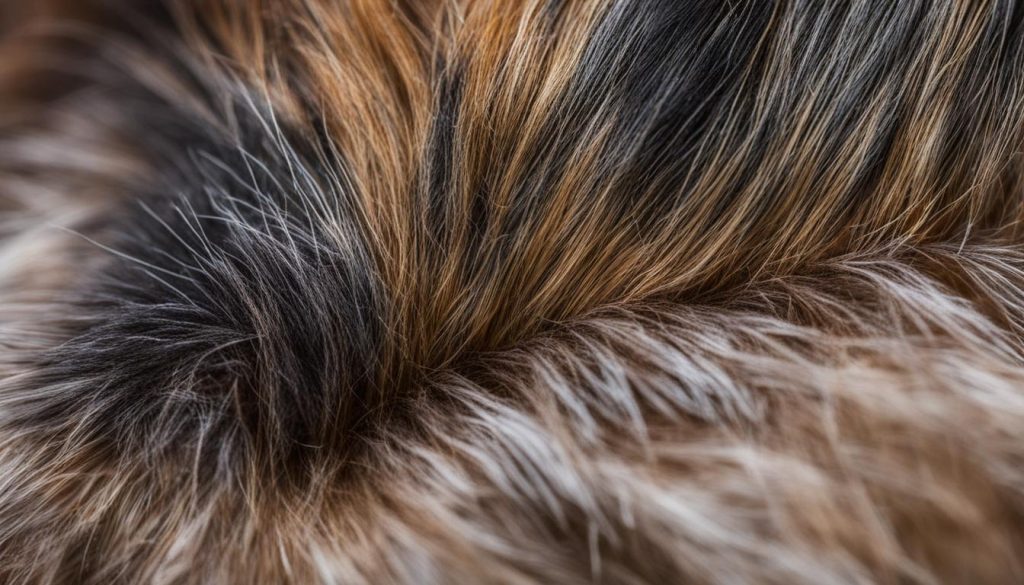As a dog owner, I love coming home to my furry friend’s excited tail wags and affectionate nuzzles. However, there are times when an unexpected whiff of something less than pleasant greets me. If you’ve ever wondered, “Why does my dog smell like fish?” know that you’re not alone in your concern. A fishy odor in dogs can be puzzling and, let’s face it, a bit off-putting. From my experience, the causes of fishy smell in dogs vary, and understanding these can be key to addressing and remedying the situation.
In my quest to keep my dog smelling fresh, I’ve realized that fishy dog odor is more common than most pet parents might think and can be attributed to factors well beyond a simple roll in seaweed at the beach. So, if you’ve noticed a fish-like scent and are hunting for dog smell remedies, stay tuned as we tackle this finicky issue head-on.
Why Does My Dog Smell Like Fish?
- Good hygiene practices, including dental care, are essential for preventing fishy dog breath and body odor.
- Understanding anal gland function can prevent issues that might contribute to your dog’s fishy smell.
- Female dogs may require special medical attention if they emit a fish-like odor related to vaginal health.
- Dietary adjustments can serve as a preventive measure against conditions leading to unpleasant odors.
- Identifying the root cause is crucial for effectively addressing fishy odor in dogs.
- Regular vet check-ups help in early detection and treatment of underlying health issues causing a fishy scent.
- Partnering with your vet for tailored dog smell remedies can enhance your pet’s well-being and household ambiance.
Identifying the Source of the Fishy Odor in Dogs
As a dog owner, I’m always alert to changes in my furry friend’s health, including any unexpected smells. If you’ve ever caught a whiff of something fishy from your dog, you’re not alone. Determining the root cause of a fishy dog skin odor or why your dog is smelling like fish is essential in addressing the issue effectively. Below, we’ll explore the reasons behind this peculiar aroma.
Common Causes for Dogs Emitting a Fish-Like Smell
Initially, when I notice a fishy smell on my dog’s fur, I consider their oral hygiene. Just like humans, dogs can suffer from gum disease and plaque buildup, leading to a fishy scent in their breath. Dental care, including regular brushing with enzymatic toothpaste, is imperative to prevent a host of oral health issues. Apart from poor dental habits, other medical conditions such as diabetes or kidney disease might also be the culprits of this fishy odor emanating from their mouth.

The Role of Anal Glands in Canine Scent Marking
The most common explanation I’ve encountered for a fishy dog skin odor relates to anal gland issues. These little sacs, situated on either side of a dog’s anus, hold a fragrant fluid that dogs use for marking territory and identification. Anal gland problems arise if they don’t empty correctly, often due to too-soft stools, which can lead to uncomfortable impactions or infections. Unfortunately, specific breeds, particularly small or overweight dogs, seem more prone to these issues, requiring closer attention and regular veterinary checks.
When to Be Concerned About Unusual Dog Smells
If the fishy odor persists despite regular hygiene practices, it’s time to take a deeper dive into your dog’s overall health. I keep an eye out for infections that could be presenting as a fishy urine smell or even vaginitis in female dogs. In the most severe cases, if left untreated, an infection can progress into pyometra, which is both dangerous and necessitates immediate surgery. Whenever you’re in doubt, I’d recommend consulting your veterinarian to pinpoint the exact cause of the fishy smell in dogs and to get a treatment plan tailored for your canine companion.
Oral Health and Fishy Dog Breath
I know that panicky feeling when you realize your cuddly companion’s breath smells less like puppy chow and more like… last week’s fish market. That fishy dog breath can send dog owners into a tailspin, worrying about their pooch’s well-being. And let’s not get started on that pungent wave hitting your nose when your pup returns from a playful swim, smelling fishier than the ocean itself. Believe it or not, most times, it’s not about how to get rid of fishy smell on dog, it’s about understanding why it’s there in the first place.
The Connection Between Dental Disease and Odor
Now, fishy dog breath isn’t just an assault on the olfactory senses, it’s often a red flag waving furiously, alerting us to potential dental disease. Imagine, by the age of two, a majority of dogs are already dealing with some form of dental issue. That’s right – those pearly whites can quickly turn into a haven for bacteria, leading to that distinct fishy scent. This truth hits harder for certain breeds predisposed to oral problems. Even with a toothbrush in hand every day, some genetics spell “bad teeth,” requiring more vigorous and frequent professional cleanings.
Signs of Oral Hygiene Issues in Dogs
Knowing the tell-tale signs can help prevent your dog from ever having to deal with gum inflammation or tooth loss. If you notice a persistent fishy odor on their breath, it might be time to peek inside that mouth and check for inflamed gums. Don’t ignore it even if your dog seems to shy away – this could be the cue that they are in pain and possibly at the starting line of dental disease.
Addressing Periodontal Disease to Improve Breath
A visit to the vet might reveal the need for a professional dental cleaning – think of it as a spa day for your dog’s mouth with tooth scaling and polishing while they’re comfortably snoozing under anesthesia. It’s a surefire way to tackle the root of fishy dog breath. But don’t wait for the stench to become unbearable; implement preventive measures like daily teeth brushing with enzymatic toothpaste designed for dogs, indulge them in dental treats, and consider a diet that supports dental health. Above all, keeping regular vet check-ups is non-negotiable to ensure your pup’s breath stays as fresh as a daisy. So the next time your dog smells like fish after swimming, it’ll just be a memory of fun times, not a sign of dental distress.
Analyzing Anal Gland Complications
As a conscientious pet owner, I’m always alert for any changes in my dog’s behavior or health signals. One peculiar symptom that’s worth understanding involves a fishy smell in dog ears or around their rear—which might not just be a case of needing a bath. It’s often an indication of an anal gland issue, something not uncommon in dogs, but definitely unpleasant and potentially painful for them.

When I noticed my dog persistently scooting across the carpet and obsessively licking their behind, it was my cue to investigate further. These behavioral indications suggest discomfort in the anal region— possibly due to impacted or infected anal sacs. This was a red flag for me to take action.
Behavioral Indications of Discomfort in Dogs
Whether it’s scooting, licking, or biting near the tail, these behaviors shouldn’t be ignored. Canines with anal sac disease exhibit such actions in an attempt to alleviate the irritation. I learned that being attentive to these signs is crucial for promptly addressing any underlying issues.
Effects of Diet on Anal Gland Health
I was surprised to learn that diet plays a significant role in anal gland health. Asking myself, “Why does my dog have a fishy odor,” led to the discovery that a low-fiber diet can result in soft stools, inadequate for proper anal gland expression. Incorporating fiber-rich supplements into my dog’s diet, like canned pumpkin, contributed to firmer stools and the natural emptying of these glands.
Routine care and awareness are key. I’ve since been mindful to communicate with my groomer about avoiding unnecessary anal gland expression and to reach out to my vet when these fishy odors suggest a deeper issue. It’s a relief to know that with the right attention and care, I can help prevent further anal sac complications for my furry friend.
Female Dog Health and Fishy Odors
As a dedicated pet owner, I always pay close attention to the health and wellbeing of my furry companions. I’ve noticed that a fishy smell in dogs is not just a peculiar annoyance but could also be a telltale sign of an underlying health issue, especially in female dogs. An unsettling fishy smell in a dog’s breath or from their body may be indicative of vaginal issues in dogs, suggesting a visit to the vet is in order. These odors, particularly in females, can be alarming and signal conditions like vaginitis or the more severe pyometra.
Vaginitis is an inflammation commonly caused by a yeast imbalance, resulting in an offensive odor. Spaying not only provides peace of mind but also greatly reduces the risk of my pet developing daunting conditions such as pyometra. The latter is an urgent situation needing immediate surgery, often seen in unspayed dogs. As a responsible pet parent, I understand that spaying and fishy odor prevention go hand in hand, safeguarding the health of my beloved companion.
Whenever I detect a persistent or concerning fishy smell in dogs, my first course of action is to consult with my trusted veterinarian. Prompt and professional diagnosis ensures that whether the remedy is as simple as antibiotics or as complex as surgical intervention, my pet receives the best care possible. After all, their health and happiness are paramount to my own, and nothing is more rewarding than seeing them thrive, free from discomfort and unpleasant odors.
FAQ
Why does my dog smell like fish?
There are several reasons your dog may have a fishy odor. Common causes include anal gland problems, poor dental hygiene, certain diseases such as diabetes or kidney problems, urinary tract infections, ear infections, and female-specific issues like vaginitis or pyometra.
What are the common causes for dogs emitting a fish-like smell?
The most common cause of a fish-like smell in dogs is often related to anal gland issues. Anal sac disease can lead to an unpleasant scent if the glands become impacted or infected. Oral health problems, urinary tract infections, and skin conditions can also lead to a fishy smell.
How do anal glands contribute to my dog’s scent marking?
Anal glands, or anal sacs, contain a smelly secretion that dogs use for identification and marking their territory. They are naturally expressed when a dog defecates, but if they don’t empty properly, the build-up can cause a fishy smell.
When should I worry about unusual dog smells?
If the fishy smell persists despite regular bathing and grooming or you notice other symptoms like scratching, biting the rear, swollen anal area, changes in behavior, or difficulty during defecation, consult your veterinarian as these could indicate a health problem.
What’s the connection between dental disease and a fishy odor in dogs?
Dental disease in dogs, such as periodontal disease, can cause bad breath with a fishy smell due to the accumulation of bacteria along the gum line and between teeth. If left untreated, these bacteria can cause infection and inflammation, contributing to the odor.
What signs could indicate oral hygiene issues in my dog?
Symptoms of poor oral health in dogs include bad breath, difficulty eating, swollen or bleeding gums, loose or missing teeth, and reluctance to chew toys. If you notice a fishy smell coming from your dog’s mouth along with these signs, it’s important to address their oral hygiene.
How can I address periodontal disease to improve my dog’s breath?
To improve your dog’s breath and prevent periodontal disease, implement regular tooth brushing with canine-specific toothpaste, offer dental chews, maintain a diet that supports dental health, and schedule professional dental cleanings with your veterinarian.
What behavioral indications suggest discomfort due to anal gland problems?
Dogs with anal gland discomfort may scoot their bottom on the ground, lick or bite near their anus, have difficulty sitting, or exhibit other signs of distress. If you notice these behaviors, it might be time to check their anal gland health.
How does my dog’s diet affect their anal gland health?
A diet lacking in fiber can result in soft stools, which may not apply enough pressure to naturally express the anal glands during defecation. Adding more fiber, like canned pumpkin, to your dog’s diet can help firm the stools and promote proper gland expression.
Why might a female dog emit a fishy odor?
Female dogs might emit a fishy odor due to vaginal infections like vaginitis or a serious uterine infection known as pyometra. Incontinence, urinary tract infections, and normal hormonal changes can also cause a fishy smell in female dogs.






